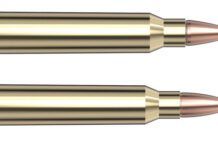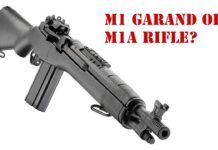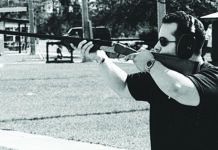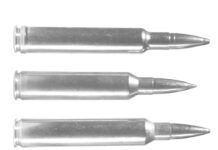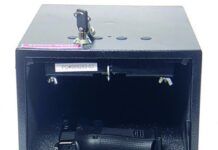If you haven’t heard yet, be advised that millions of gun owners may soon be classified as felons if a new Bureau of Alcohol, Tobacco, Firearms and Explosives (BATFE) rule isn’t blocked by the courts. The ruling affects owners of pistols with stabilizing braces, which the Bureau covers in its “Final Rule 2021-08F.” According to BATFE in the agency’s “Frequently Asked Questions For Final Rule 2021-08F” document listed on ATF.gov, “The rule outlines the factors ATF considers when evaluating firearms equipped with a purported ‘stabilizing brace’ (or other rearward attachment) to determine whether these weapons would be considered a ‘rifle’ or ‘short-barreled rifle’ under the Gun Control Act of 1968 (GCA), or a ‘rifle’ or ‘firearm’ subject to regulation under the National Firearms Act (NFA). (The term ‘SBR’ is used to describe both GCA short-barreled rifles and NFA rifles with a barrel of less than 16 inches throughout these FAQs). The final rule’s amended definition of ‘rifle’ clarifies that the term ‘designed, redesigned, made or remade, and intended to be fired from the shoulder’ includes a weapon that is equipped with an accessory, component, or other rearward attachment (e.g., a ‘stabilizing brace’) that provides surface area that allows the weapon to be fired from the shoulder, provided other factors, as listed in the definition, indicate the weapon is designed and intended to be fired from the shoulder.”
Okay, that’s a lot of language for a very simple idea: BATFE, on its own, but with political cover from the Department of Justice and the Biden Administration, redefined millions of mostly AR-style pistols with braces as short-barreled rifles, the latter of which are covered under the National Firearms Act. Generally, if you want to own an SBR, you have to register it with BATFE and pay a $200 fee to get a tax stamp for each and every SBR. Owning an SBR without the stamp is a felony. Thus, your brace-equipped pistol, which may have been legal a few weeks ago, is now contraband and can get you put in prison.
Now, I have forecast this development for several years, and as I explained most recently in the April 2022 issue, that’s why Gun Tests has only covered brace-equipped firearms once. I fired some brace-equipped pistols several times, and every time, I wondered how long it would be before BATFE would spring the trap on unsuspecting gun owners and simply outlaw them as regular firearms, and now we know. Now, I didn’t have this insight because I’m some smart m*f*r. I just recognized how simple it would be for certain stars to align to encourage BATFE to take these steps. The most hilarious part of this is BATFE has previously approved many of the braces as okay for use on pistols — in writing! Those letters have been remanded. The joke’s on us!
For myself, any firearms devices such as these I might have owned were lost in an unfortunate canoeing accident. Just kidding. I’ve never owned a braced pistol because I didn’t want to wake up one day and be a felon. If you did, then what are your options?
If you as an individual own one of these braces attached to a firearm, you have 120 days from the official promulgation of the rule to exercise your “Compliance Options.” Those are:
- Submit through the eForms system an Application to Make and Register a Firearm, ATF Form 1 (E- Form 1) within 120-days from the date of publication in the Federal Register.
- Permanently remove or alter the “stabilizing brace” so that it cannot be reattached and thereby removing it from regulation as a “firearm” under the NFA.
- Remove the short barrel and attach a 16-inch or longer rifled barrel to the firearm thus removing it from the provisions of the NFA.
- Turn the firearm into your local ATF office.
- Destroy the firearm.
Sound good? Better get busy on your Compliance Options, because a DOJ release on Friday, Jan. 13, 2023, said the Final Rule had been submitted to the Federal Register. Certainly the rule might be stopped by court order or some other intervention, but the clock is ticking.
The news around guns isn’t all bad, however. Texas Attorney General Ken Paxton determined that Citigroup has anti-gun discriminatory corporate policies, so that bank isn’t eligible to offer certain financial services in the state. A 2021 Texas law requires corporations competing for municipal contracts in the Lone Star State to certify they do not hold discriminatory policies against lawful firearm businesses. Citigroup submitted a certification letter attesting they do not hold such policies. However, their own website demonstrates that the corporate bank refuses business with firearm businesses that do not comply with their unconstitutional restrictions, including age-based gun bans, unlawful magazine restrictions, and bump-stock bans (which was recently ruled unconstitutional in the U.S. Court of Appeals for the Fifth Circuit.) Being out of step with the 2nd Amendment will cost Citigroup billions of dollars in business in Texas. If your state doesn’t have a similar law, it should. This is how we win.
In similar news out of Florida, state legislators are warning financial service providers not to track the shopping habits of gun and ammunition buyers. Florida is the first state to do so and might not be the last. The move is the latest effort by 2nd Amendment supporters to go on offense against banking institutions that use their weight to push backdoor boardroom gun control. The Florida Arms and Ammo Act is a first-in-the-nation measure to prohibit businesses from tracking Floridians’ firearm and ammo purchases. It is in direct response to a new effort by credit card processors to monitor and track lawful purchases by law-abiding Americans that the financial companies deem “suspicious.” The effort has been led by Amalgamated Bank CEO Priscilla Sims Brown, who pushed the International Organization for Standardization (ISO) to create a credit card Merchant Category Code (MCC) to allow the banking system to track when law-abiding Americans lawfully purchase anything remotely related to firearms and ammunition. More of this, please.
The U.S. Court of Appeals for the Fifth Circuit has overwhelmingly ruled that the Bureau of Alcohol, Tobacco, Firearms and Explosives (ATF) overstepped its authority when it published a Final Rule that classified bump stocks as “machineguns.” The Trump-era ban was in reaction to the crimes by a depraved murderer in Las Vegas in 2017. “A plain reading of the statutory language, paired with close consideration of the mechanics of a semi-automatic firearm, reveals that a bump stock is excluded from the technical definition of ‘machinegun’ set forth in the Gun Control Act and National Firearms Act,” the majority opinion states.
Further, the ruling said, “As an initial matter, [the rule] purports to allow ATF — rather than Congress — to set forth the scope of criminal prohibitions. Indeed, the Government would outlaw bump stocks by administrative fiat even though the very same agency routinely interpreted the ban on machineguns as not applying to the type of bump stocks at issue here,” the opinion states. “Nor can we say that the statutory definition unambiguously supports the Government’s interpretation. As noted above, we conclude that it unambiguously does not. But even if we are wrong, the statute is at least ambiguous in this regard. And if the statute is ambiguous, Congress must cure that ambiguity, not the federal courts.”The Fifth Circuit’s ruling gets to the heart of the matter. Can the ATF — working on behalf of a president — rewrite law on their own? The court says it can’t. Perhaps the same judicial restraint can be imposed on the stabilizing brace rule as well.





